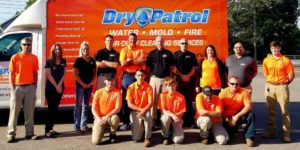
Dry Patrol of Central Ohio, a water damage restoration company, gets paid within 17 days of sending an invoice. A payment collection cycle under 30 days is almost unheard of among restoration contractors.
So, how did Dry Patrol manage to start getting paid so fast? They started sending preliminary notices to open lines of communication with customers and insurance adjusters.
Life for Dry Patrol before sending notices
Before learning how to leverage his lien rights as a restoration contractor, Bryan Daughtry, the owner of Dry Patrol, often struggled to collect payment from his customers’ insurance companies.
“It is a pure chess game with every invoice and every insurance company that we deal with because they’re going to try and do these three things — delay, deny, and defend — to protect their bottom line and their profit margin as long as possible,” Bryan explained.
Their average DSO (Days Sales Outstanding, or payment collection time) was around 90 days.
“I didn’t know anything about this business when I got in it. So I learned that I’m at the mercy of the insurance company. They’re going to pay me what they’re going to pay me, and that might be 90 days from now,” said Bryan.
In cases where Dry Patrol wasn’t receiving payment, Bryan would try to file a lien, but this was often a stressful process: “…when we did have to place a lien, I was going to either Delaware County Courthouse or Franklin County Courthouse, and wasting time dealing with the auditors’ office to file it and stressing about whether I got my margins right and everything of that nature. So that was basically the process before, and I don’t miss it one bit,” said Bryan.
Additionally, this was a reactionary way of protecting payments, which negatively impacted customer relationships.
“We never placed the lien unless we absolutely had to, so it was usually in the ninth hour,” Bryan said. “So there may have been a little more of a surprise factor then because there wasn’t as much proactive communication in setting the expectations up front with the customer.”
Life for Dry Patrol after sending notices
Bryan knew that something needed to change. He decided to partner with Levelset to cut down on the time it took to get paid.
“The biggest difference is our outstanding AR cycle — the lifecycle probably being anywhere from 60 to 90 days down to 17 days now. I can’t emphasize that 17-day cycle enough and the power and value of it. I’m not aware of any other restoration companies who are being paid in that quick of a fashion.”
Dry Patrol sends a preliminary notice to the property owner and insurance adjustor on every job where they aren’t paid upfront.
“So every time we send out an invoice (so we’ve finished the job), that’s when we’re entering the customer’s information as a project in Levelset. And then, we automatically send out the preliminary notice so that we can verify all their information is correct. We do send everything to the adjuster if there is one, or the insurance company if [there is] a direct email,” said Jeanine, the Dry Patrol Office Assistant.
By consistently sending formal notices, Dry Patrol appears more professional to the insurance adjusters, and their payments are prioritized over other insurance claims.
“When the adjusters get this communication from us or from Levelset, they quickly see that Dry Patrol of Central Ohio is handling this differently than 95% of the other restoration companies,” Bryan said. “[They think], ‘We need to deal with this situation differently than we’re dealing with all these [other] situations because they’re not playing any games over here.”
Bryan also uses Levelset to file mechanics liens when necessary — but he almost never needs them because sending notices is so effective at getting his company paid. And if he does need to file a lien, Levelset makes the process much easy and stress-free — and, cuts out trips to the county recorder.
After one year of using Levelset to send notices on Dry Patrol’s jobs, Bryan saw several improvements in his business.
“The biggest difference is our outstanding AR cycle — the lifecycle probably being anywhere from 60 to 90 days down to 17 days now,” said Bryan. “I can’t emphasize that 17-day cycle enough and the power and value of it. I’m not aware of any other restoration companies who are being paid in that quick of a fashion. If anyone can get to 30 days, they’re ecstatic…so [for us] to get it from 90 days down to 17, it has done incredible things for business and for my well-being.”
By consistently sending notices, Bryan now has better customer relationships, a shorter payment cycle, and — best of all — peace of mind.
Getting paid faster isn’t unique to Dry Patrol. Restoration companies across the US are moving to the front of the payment line by using Levelset.

Start collecting payments faster
Schedule a call with our team to learn how you can get paid faster with Levelset.